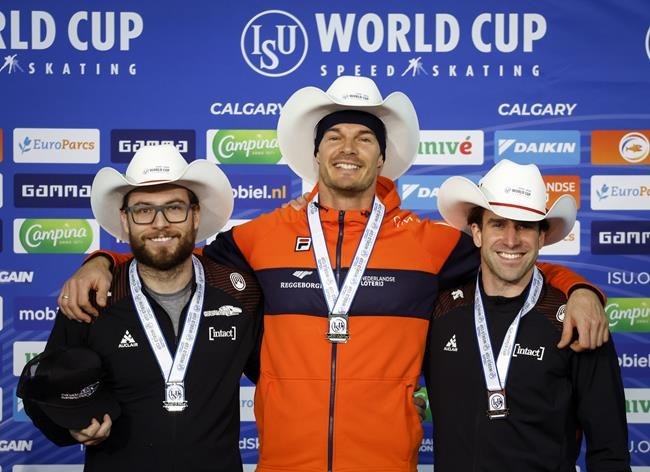CALGARY — Laurent Dubreuil's love-hate relationship with speedskating's 1,000 metres has swung closer to love, but it's still a painful bond.
Ranked first in the world in the men's 500 metres, Dubreuil collected a silver medal Sunday in a World Cup 1k just two hundredths of a second behind victor Hein Otterspeer of the Netherlands.
Antoine Gélinas-Beaulieu of Sherbrooke, Que., was third to put two Canadians on a World Cup speedskating podium for the first time since 2015.
Dubreuil earned his second medal in as many days after taking Saturday's 500 at Calgary's Olympic Oval.
That's his signature race, but Dubreuil has made gains over double that distance.
The 30-year-old from Lévis, Que., didn't earn a single World Cup medal in the 1k last season, yet achieved Olympic silver in Beijing's Winter Olympics in February.
Dubreuil's opening speed had him leading by half a second after 600 metres Sunday, but that pace doesn't leave the sprinter much for the final lap.
"I feel unbelievable pain," Dubreuil said. "It's a love-hate relationship with the distance. I'm happy after I've done it, but the 10 minutes leading up to it I hate my life for signing up for it. It's extreme burning in the legs and just a whole body failure kind of thing.
"When you get results, the pain is worth it."
Dubreuil, the defending World Cup champion in the 500, was also second in the 1,000 season-opener in Stavanger, Norway.
"When I have a good race, I'm very difficult to beat, but Hein was just a couple hundredths faster," Dubreuil said.
"I don't know how much better I'll get at it during my career. I think I can still be a bit better. It's good enough to win medals and I just hope to turn those silvers into gold at some point."
Gélinas-Beaulieu's bronze was his first career World Cup medal in an individual race.
Canada's Denny Morrison and Vincent de Haitre were first and third, respectively, in a men's 1,000 in the 2015 World Cup final.
Gélinas-Beaulieu felt sleep-deprived heading into Sunday because of a combination of his asthma and Calgary's altitude and dry air.
"The last few days have been hard on my lungs," Gélinas-Beaulieu said. "Then we figured out a plan to ease the symptoms. The doctor and medical team was very helpful for me.
"It made me more confident to attack this race. After the opener, I already knew I was going to have a good race. Doing that at 30 years old, I think that's a good accomplishment."
The host Canadian team collected five medals, including two gold, in the first of two consecutive speedskating World Cups in Calgary.
The Dutch led all countries with a dozen medals, including five gold. Another three days of racing starts Friday at the oval.
Ottawa's Ivanie Blondin was stripped of her third-place finish in the women's mass start Sunday when officials disqualified her for an infraction.
The Olympic silver medallist was deemed to have made a competitor slow down when Blondin changed lanes early in the race.
Olympic champion Irene Schouten and Marijke Groenewoud of the Netherlands were first and third with American Mia Kilburg placing second.
The mass start is a 16-lap race of 16 racers jostling for position for a final sprint.
When competitors moved to inside lanes for a potential breakaway, Blondin says she also moved inside to get in front of them, and either prevent or join a breakaway.
"Where my confusion is, I got cross-tracked in the final lap on the backstretch," Blondin said. "I was impeded on by Schouten so I don't understand why she didn't get disqualified then. It seems like the referees aren't exactly on our side right now."
Andrea Giovannini of Italy took the men's mass start ahead of runner-up Peter Michael of New Zealand and Vitaliy Chshigolev of Kazakhstan in third.
Jutta Leerdam of the Netherlands won her third women's 1,000 in as many races this season. Olympic champion Miho Tagaki of Japan was second and Kim Goetz of the U.S. finished third.
The International Skating Union has banned Russia and Belarus from skating events in response to Russia's invasion of Ukraine and Belarus's support of it.
This report by The Canadian Press was first published Dec. 11, 2022.
Donna Spencer, The Canadian Press



